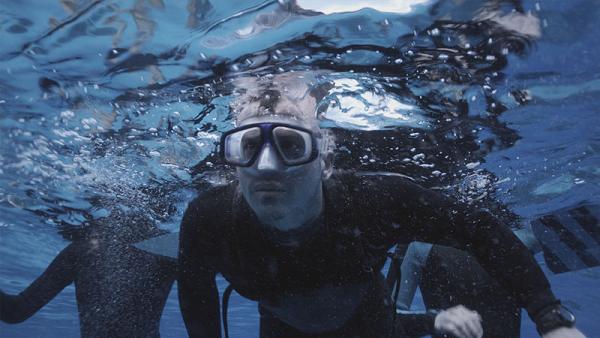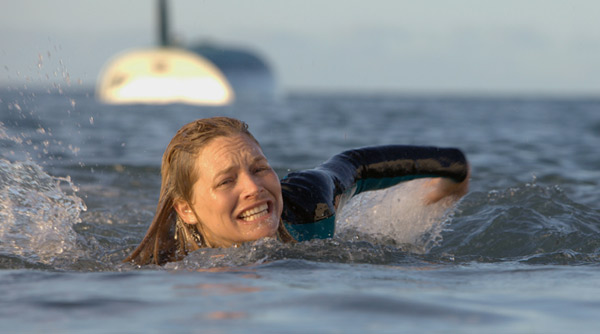Filmmaker Andrew Traucki is not a stranger to things that go "Chomp!" in the water. His 2007 debut Black Water, an intimate horror/thriller about a group of friends stalked by a killer croc, was well received by critics and audiences alike.
Now Traucki returns with The Reef, an intimate horror/thriller about a group of friends (Damian Walshe-Howling, Zoe Naylor, Adrienne Pickering and Gyton Grantley) stalked by a killer great white shark.
Matt’s Movie Reviews was fortunate enough to talk to Traucki about the making of The Reef, the collective fear of sharks, and the key ingredients in making a thriller.
Enjoy!
The film is loosely based on a true life incident. What are the details of that story, and what similarities are there in the film?
Andrew Traucki: I heard about the story 10 years ago, and it stayed with me. So I thought it would be a good idea to make it. It’s quite similar to the real story, but changed enough so it’s my take, so while the film says “loosely based”, it is not that loosely based.
Was it set in the same waters in the film, or was it somewhere else?
AT: It happened in Townsville, but the film is set and shot in Harvey Bay, which is a bit south of that.
Your previous film Black Water has many similarities with The Reef thematically and subject wise. Was there any hesitation to direct The Reef so soon after Black Water?
AT: No, not at all. I believe there are similarities, but also differences. It’s interesting with people on the net, because the film was already released in the UK, saying how wonderfully scary and thrilling the film is, so I don’t think it’s really a problem.
Your actors are evoking some raw emotions, and doing so in a unpredictable setting. What was the process in getting them in that headspace?
AT: Casting is very important. Once you have chosen people who you know are both intelligent and good actors, with hopefully the emotional range you want and stability that you need, we go and have a week’s rehearsal where hopefully the process will be that they now are only actors, that they are no longer mine and I give the characters to the actors, and they hopefully become those characters and know more about them than I do.
So for me that weeks’ rehearsal is really important, because it lets the actors fully understand what I’m hoping the characters might do and also for them to bring something to the roles. That’s my main approach, and then on set you try...because this was a very fast shoot, there isn’t much time to improvise, so it’s really about them leaning back on what we’ve done in rehearsal to make sure we are on the right page.
 |
"What the audiences goes to see is humans and how they react and their emotion, and certainly if you can’t have any empathy for the characters well, two minutes in and you are gonna walk away." -
Andrew Traucki |
You like to shoot close, filling the frame with the faces of your actors. Is that something actors are usually comfortable with?
AT: As long as it’s there face and not someone else! (laughs) The more close ups they get, the more happy hey get, I believe. I think on the whole they have no complaints going close on them. I don’t think actors mind in the slightest.
Movies filmed in water are often treacherous. Was that the case here as well?
AT: Yeah, it was a difficult shoot. Damien trod on a poisonous fish, maybe a stone fish, we’re not sure. So he got an infection in his foot and was off the shoot for a day, and then Adrienne got sea sick, so thank God everyone was bullet proof.
Then the crew had to go through numerous ordeals with the weather changing on us all the time, because we were outside alone in the tank. So it was a treacherous shoot, and something that I thought would be a lot simpler than it was.
What I love about your movies is that you use real footage, and superimpose it into the film. Any pressure to succumb to CGI?
AT: There was on Black Water, but I think because I pulled that off so successfully there wasn’t any pressure on this one. People just kind of said, “Well, he’s done it. Let him do what he does, because it works.”
The only thing was whether we could get the shark footage, and luckily, touch wood, we ended up getting some great shark footage, and there wasn’t much use for CGI then.
You place a lot of emphasis on character. Is that the essential ingredient in selling a thriller?
AT: I think it’s an essential ingredient in making any film ,really. What the audiences goes to see is humans and how they react and their emotion, and certainly when you have a two or three, or in this case a four hander, if you can’t have any empathy for the characters well, two minutes in and you are gonna walk away.
So I think it is incredibly important that you have characters that the audience can relate to.
 |
| "I think it’s a morbid fascination many, many people have. I think it’s genetically within us. Long time ago we got eaten by big things, so that’s still there in the back of our conscious." - Andrew Traucki |
The shark’s predatory habits are very realistic. Was there ever a temptation to sensationalise the attacks?
AT: My whole shtick is to be as real and down to earth as possible. I did actually have more shark action, but in the end I cut it out for that very reason, that I didn’t want to sensationalise it and make it as down the line as I could.
It’s hard. You have everybody in the film business saying, “Well you gotta have this happen, you gotta have a shark attack in the first five minutes like in Jaws”...you gotta do this and that, but if you do that, you’re making something that is very cliché, so I resisted the temptation to over emphasis the shark in that way.
The Reef taps into a fear many of us have. I especially have a terrible fear of sharks and the water. Does death by shark also scare you? And is it that fear which drove you to make this film in the first place?
AT: Well I surf once a week, so I’m in the water a lot! (laughs) There is always that fear in the back of your mind..being a rational person, I know that the chances of actually being taken by a shark are less than being stung to death by bees, or hit by a car and all of those sort of things.
I think it’s a morbid fascination many, many people have. I think it’s genetically within us. Long time ago we got eaten by big things, so that’s still there in the back of our conscious. I’m totally fascinated by them, but I use the rational side of my brain to make sure it doesn’t stop me from enjoying the water (laughs).
Speaking of that rationality, over the years the education of sharks has been much more paramount and frequent. Has the public’s acceptance of the realities of human fatalities by shark lessened the fear of them?
AT: Well, I don’t think it takes much for the media to whip up a frenzy, the way their saying shark attack are on the increase, because we haven’t been killing them. So already there is paranoia about sharks again.
But I do think ultimately people are much more aware than back in the 70s, that actually the shark are the ones that are in danger, and they’ve got more of a right to be in the sea because it’s their home, so therefore let’s just back off and not try and kill everything.
|
